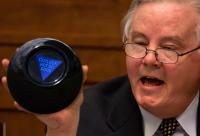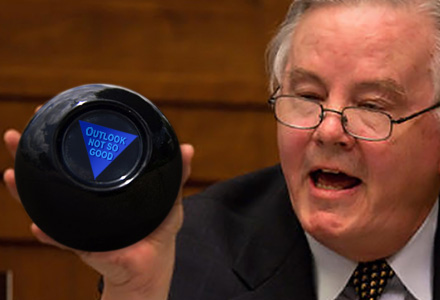 If Black Friday hit you with any weight at all – maybe you’re an American online poker player, maybe you made your money playing against Yankee fish, maybe you just enjoy following arcane topics – chances are you’ve been eagerly gobbling up all the news you can get about a number of bills pending in the U.S. Congress to legalize and regulate online poker. You know, then, that it’s frustratingly difficult to figure out exactly what’s going on, much less to construct any kind of timeline for when Americans will be able to get back to the virtual felt.
If Black Friday hit you with any weight at all – maybe you’re an American online poker player, maybe you made your money playing against Yankee fish, maybe you just enjoy following arcane topics – chances are you’ve been eagerly gobbling up all the news you can get about a number of bills pending in the U.S. Congress to legalize and regulate online poker. You know, then, that it’s frustratingly difficult to figure out exactly what’s going on, much less to construct any kind of timeline for when Americans will be able to get back to the virtual felt.
All of the information conflicts. Mainstream news sources barely report on poker unless there’s some sensational aspect they can overblow. (“The US Attorney says an online poker room is a Ponzi scheme? Bump it to the top of the page!”) Your average poker news source, meanwhile, consistently peddles a narrative implying that legalization and regulation are literally right around the corner. (“The Congressman mentioned poker once in a 20-minute speech. How is ‘Momentum builds for Barton poker bill’ for a headline?”) On top of all that, there are the four hours of hearings that have been held so far by the House Energy and Commerce Committee. Not only have they barely scratched the surface when it comes to identifying the issues of importance in creating a brand-new regulation regime for a multibillion-dollar industry, they have spent part of that time focused on a number of issues that are ancillary at best (bots and the potential of implementing skill-based rating systems) and raise major privacy issues at worst (FairPlay USA’s proposal to implement biometric identification schemes).
So, given all of that, what exactly are the prospects of Americans playing an explicitly legalized and fully regulated form of online poker in 2012? They’re really pretty poor. I know, I’m probably raining on your parade, but I’ve consulted all the best sources and every one of them tells me the same thing. My Magic 8-Ball told me “Outlook not so good.” My tea leaves were clustered together in one small part of my cup, indicating the wealth isn’t ready to be shared quite yet. And the liver from the sheep I slaughtered* didn’t produce any definite signs that the gods were sufficiently pleased and ready to allow Americans back to the online poker tables.
Note that my attempts at prognostication didn’t take into account the latest email blast from the Poker Players Alliance. That’s the one asking for money because “we’re closer to passing an online poker bill in the U.S. Congress than ever before.” The PPA says that because Rep. Joe Barton has requested a vote on his bill in committee, but if and when that comes it won’t even mark the first time a licensing and regulatory bill has been voted on in Congress. (That honor belongs to Rep. Barney Frank’s Internet Gambling Regulation, Consumer Protection and Enforcement Act, which passed the House Financial Services Committee by nearly a 2-to-1 margin on July 28, 2010.) Even if the bill coming up for a vote really were “closer than ever to becoming law,” it’s not actually close to becoming law. If I had lived in New York City all my life and I took a trip to Florida, I’d be closer than ever to the South Pole but I wouldn’t actually be at the South Pole – no matter how many times the chairman of the South Pole Tourism Board tells me I am.
The Barton bill isn’t close to becoming law because a committee vote isn’t what makes a bill into law. If Rep. Mary Bono-Mack, the chairman of the House  Energy and Commerce Committee, called for a vote on the bill and the bill passed it would still have to pass a vote from the full House of Representatives, which is controlled by the conservative Republican Party. Then, if the bill managed to pass that vote, it would also have to be approved by the Senate. That might be a little easier since Harry Reid of Nevada is the Senate Majority Leader, but then the standalone bill authorizing an unprecedented expansion of legalized gambling would have to be signed into law by the president. In an election year, with his approval ratings already discouragingly low, that seems about as likely as hitting a one-outer on the river.
Energy and Commerce Committee, called for a vote on the bill and the bill passed it would still have to pass a vote from the full House of Representatives, which is controlled by the conservative Republican Party. Then, if the bill managed to pass that vote, it would also have to be approved by the Senate. That might be a little easier since Harry Reid of Nevada is the Senate Majority Leader, but then the standalone bill authorizing an unprecedented expansion of legalized gambling would have to be signed into law by the president. In an election year, with his approval ratings already discouragingly low, that seems about as likely as hitting a one-outer on the river.
Realistically, the desire of American poker players to get back to the tables comes in near the bottom of a long list of factors that will affect any bill to legalize and regulate online poker. The real influencers in this scenario are casino companies and gaming control boards and Indian tribes and government agencies and individual Congressmen, some of them for poker and some against it and some of it undecided, all of whom have a lot more money and power on the line with this bill than the players do. To think that any sort of licensing and regulatory regime would be created overnight without sorting out all of their concerns and demands is just crazy. The only way anyone should count on poker being suddenly legalized is if it the Barton bill were attached to another must-pass bill. That, of course, is how the UIGEA was originally foisted upon the American public, and it’s become abundantly clear over the last five years just how poorly written that legislation was. Any poker bill passed outside of normal legislative channels is likely to create the same sorts of problems that came about when UIGEA went from being a fever dream in the minds of a handful of social conservatives to the hastily constructed and ill-considered law of the land. UIGEA was so poorly written that it didn’t even bother to define the illegal gambling it was enacted to prevent; there’s no reason to believe that a bill shoved through Congress to legalize online poker would differ vastly in quality. The system would be just as fundamentally broken as it is today, with the one minor difference that you could check-raise donkeys in your underwear once again.
Of course, that would be just fine with millions of American poker players. The fact is that what most of them want is just to play the game, regardless of how any sort of licensing scheme is put together or what tax rates are paid on winnings or how big an invasion of their privacy they have to deal with in order to be allowed to sit at the table – or even how long they have to wait. So don’t be surprised when Congress decides to keep American poker players out of the action past 2012.
* – No actual sheep were harmed in the writing of this article.
